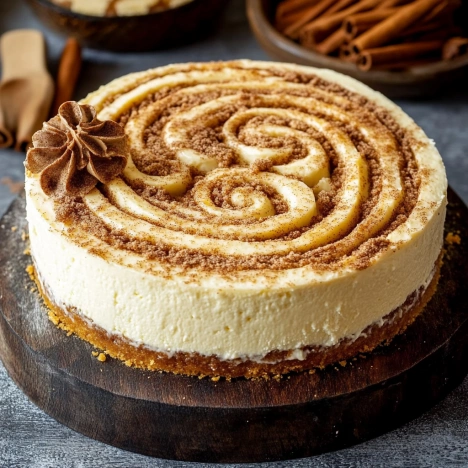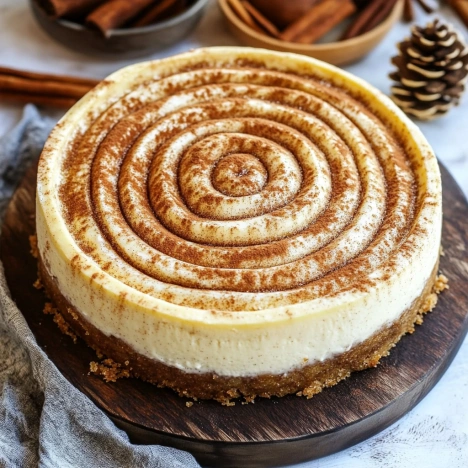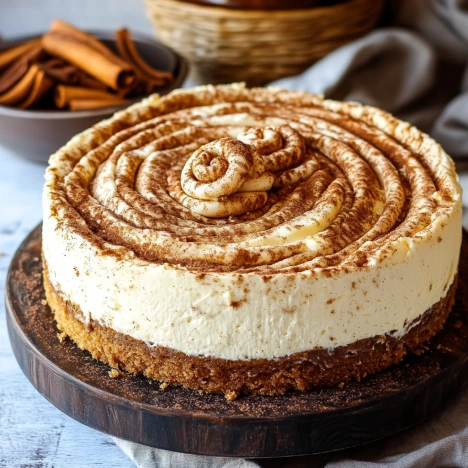 Pin it
Pin it
This decadent cinnamon roll cheesecake combines two beloved desserts into one spectacular treat. The rich, creamy cheesecake layer gets infused with warm cinnamon swirls reminiscent of your favorite breakfast pastry, all atop a buttery graham cracker crust. The finishing touch is a cloud-like cream cheese frosting that brings everything together. It's a showstopper dessert that delivers all the comfort of cinnamon rolls in each luxurious slice.
I first made this for my sister's birthday gathering last year, and it disappeared within minutes. The look on everyone's faces when I cut into it and revealed those beautiful cinnamon swirls was priceless. Even my nephew who claims he "doesn't like cheesecake" had two slices!
Ingredients
- Graham crackers (1½ cups crumbs): Creates the perfect sturdy base for your cheesecake. Look for plain graham crackers without added flavorings - the freshest crackers will give you the best texture.
- Brown sugar: Appears in multiple components of this recipe, providing a caramel-like depth from its molasses content. Dark brown works best for deeper flavor.
- Cinnamon: The star spice that makes this dessert special. Use fresh cinnamon for the most vibrant flavor - I prefer Ceylon cinnamon for its subtle complexity.
- Unsalted butter: Binds the crust together and enriches the cinnamon swirl. Always use unsalted to control salt levels precisely.
- All-purpose flour: Helps thicken the cinnamon filling so it creates distinct swirls rather than disappearing into the batter.
- Cream cheese (4 packages): The foundation of any good cheesecake. Must be full-fat and properly softened for a smooth, lump-free batter.
- Granulated sugar: Works alongside brown sugar to perfectly balance sweetness.
- Sour cream: Adds tanginess and creates that signature silky cheesecake texture.
- Eggs: Provide structure and richness. Room temperature eggs incorporate much more smoothly than cold ones.
- Vanilla extract: Use pure extract (not imitation) for the best flavor profile.
- Heavy whipping cream: Creates a light, mousse-like frosting that won't weigh down your cheesecake.
- Powdered sugar: Dissolves perfectly into the frosting without any graininess.
Cooking Instructions
- Step 1:
- Begin by preheating your oven to 325°F. Break graham crackers into smaller pieces before pulsing in your food processor until you achieve fine, even crumbs. Transfer these crumbs to a mixing bowl and thoroughly mix in the brown sugar and cinnamon until all dry ingredients are well combined. Melt the butter completely, then pour it over your crumb mixture. Use a silicone spatula to fold everything together until every crumb is moistened. The mixture should hold together when pressed between your fingers. Press this mixture firmly and evenly across the bottom of your springform pan, using the bottom of a measuring cup to create a compact, level surface. Bake for exactly 10 minutes until just set but not browned, then remove and cool completely on a wire rack.
- Step 2:
- In a medium bowl, whisk together the brown sugar, flour, and ground cinnamon until no lumps remain. Melt the butter until just liquid but not hot, then pour it into your dry mixture. Use a fork to stir until everything comes together into a moist, crumbly mixture resembling wet sand. Set this aside at room temperature while you prepare the cheesecake batter. Do not refrigerate as it will harden too much to sprinkle properly.
- Step 3:
- Thoroughly grease the sides of your springform pan to prevent sticking. In the bowl of a stand mixer fitted with the paddle attachment, beat the cream cheese on medium speed for a full 3 minutes until completely smooth and creamy with no lumps whatsoever. Add both brown and granulated sugars, then continue beating for another 2 minutes until the mixture becomes lighter in color and texture. Stop the mixer and use a spatula to scrape down the sides and bottom of the bowl, ensuring no cream cheese is stuck anywhere. Add the sour cream and mix just until incorporated. With the mixer on low speed, add eggs one at a time, allowing each to fully incorporate before adding the next. Mix in vanilla extract and salt with just a few rotations of the paddle - remember that overmixing after adding eggs can lead to cracks in your finished cheesecake.
- Step 4:
- Pour one-third of your prepared batter into the pan over the cooled crust, spreading it into an even layer with an offset spatula. Take one-third of your cinnamon swirl mixture and crumble it between your fingers as you sprinkle it evenly over the batter. Pour another third of the batter over this cinnamon layer, carefully spreading it without disturbing the swirl beneath. Repeat the process with another third of the cinnamon mixture, then add the final portion of batter. Top with the remaining cinnamon mixture, using your spatula to gently press some of the crumbs into the surface to prevent cracking. Wrap the bottom and sides of your springform pan with 3-4 layers of heavy-duty aluminum foil, ensuring there are no gaps where water could seep in. Place the wrapped cheesecake in a larger roasting pan and carefully pour hot water into the roasting pan until it reaches about 1 inch up the sides of the springform. This water bath is crucial for even baking. Bake at 325°F for 60-75 minutes, until the edges are set but the center still jiggles slightly when gently shaken. Turn off the oven but leave the cheesecake inside with the door closed for 1 full hour to cool gradually. Then remove it from the water bath, discard the foil, and refrigerate uncovered for at least 6 hours or preferably overnight.
- Step 5:
- In a medium bowl, beat the softened cream cheese until completely smooth, about 1 minute. Add powdered sugar and continue beating until fully incorporated with no graininess. Mix in vanilla extract until just combined, then set this mixture aside. In a separate chilled bowl, whip the heavy cream until stiff peaks form - this usually takes 2-3 minutes at high speed. The cream should stand up in firm peaks when you lift the beaters. Using a flexible spatula, gently fold the whipped cream into the cream cheese mixture in three additions, maintaining as much air as possible while ensuring no streaks remain. Transfer this frosting to a piping bag fitted with a round tip. Remove the fully chilled cheesecake from the refrigerator and carefully release it from the springform pan. Pipe the frosting in a decorative spiral on top of the cheesecake, starting from the outside edge and working toward the center. Finish by lightly dusting the top with cinnamon for visual appeal and an extra hint of spice.
 Pin it
Pin it
I've always been particularly drawn to cinnamon in desserts. My grandmother used to make cinnamon toast for me as a child, and that warm, comforting aroma still takes me right back to her kitchen. When I first attempted this recipe, I experimented with different cinnamon varieties and found that Ceylon cinnamon offers a more delicate, complex flavor that really elevates this cheesecake from good to extraordinary.
Make-Ahead Tips
This cinnamon roll cheesecake is actually improved by making it in advance. The flavors meld together beautifully as it chills, creating a more cohesive and intense cinnamon experience. You can prepare the entire cheesecake up to three days before serving - just add the frosting the day you plan to serve it. If you're really pressed for time, you can even freeze the undecorated cheesecake for up to a month. Simply thaw it overnight in the refrigerator and add the frosting before presenting it to your guests. The texture remains remarkably creamy even after freezing, something I discovered by accident when I made too many for a holiday gathering.
Troubleshooting Common Issues
Even experienced bakers sometimes encounter challenges with cheesecakes. If you notice cracks forming during baking, don't panic - the cream cheese frosting will cover them perfectly. Cracks typically happen due to three main causes: overmixing the batter (which incorporates too much air), baking at too high a temperature, or cooling too quickly. The gradual cooling period in the turned-off oven is absolutely crucial to prevent the dramatic temperature change that causes the surface to crack. If your cinnamon swirl mixture seems too dry, add an extra tablespoon of melted butter. Conversely, if it's too wet, sprinkle in a bit more flour to achieve that perfect crumbly consistency that creates distinct layers in your finished cheesecake.
 Pin it
Pin it
Serving Suggestions
While this cinnamon roll cheesecake is undoubtedly a showstopper on its own, there are several ways to elevate the presentation further. I love serving each slice with a small drizzle of warm caramel sauce, which complements the brown sugar and cinnamon beautifully. For texture contrast, consider adding a sprinkle of toasted chopped pecans on top of the frosting. If you're serving this for a special brunch, pair it with a rich coffee or espresso to balance the sweetness. For dinner parties, a small glass of tawny port makes an exceptional companion to the warm spice notes. Remember to slice with a thin, sharp knife wiped clean between cuts for the cleanest presentation of those beautiful cinnamon swirls.
Frequently Asked Questions
- → How do I prevent the cheesecake from cracking?
Bake the cheesecake in a water bath and avoid over-mixing the eggs. Allow the cheesecake to cool gradually by turning off the oven and leaving it inside for an hour.
- → Can I use a different crust instead of graham crackers?
Yes, you can use digestive biscuits, crushed cookies, or even a crust made from crushed cinnamon graham crackers for extra flavor.
- → What’s the best way to get smooth cheesecake batter?
Start with room-temperature ingredients, especially cream cheese, and scrape the bowl often to ensure a lump-free batter.
- → How long should I refrigerate the cheesecake before serving?
Refrigerate the cheesecake for at least 6 hours, but overnight is ideal for the best texture and flavor.
- → What piping tip do I use for decorating?
Use a round piping tip to create a swirl of cream cheese frosting on top of the cheesecake.
- → Can I make this cheesecake ahead of time?
Yes, this cheesecake can be prepared 1-2 days in advance. Keep it covered in the fridge to maintain freshness.
